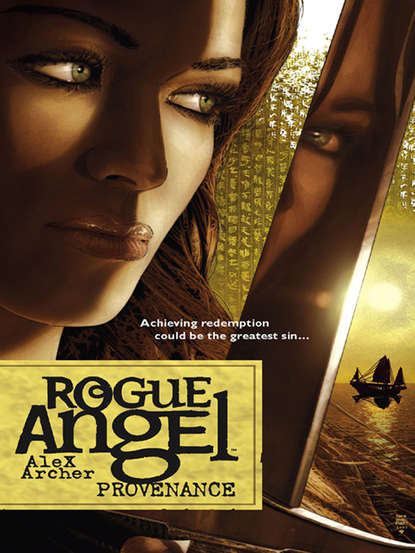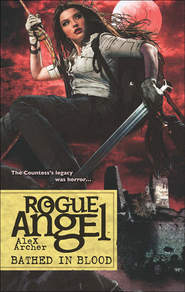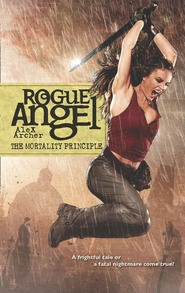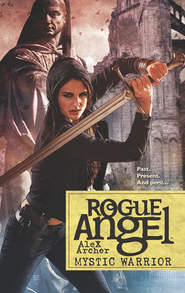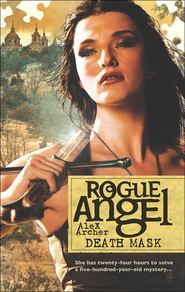По всем вопросам обращайтесь на: info@litportal.ru
(©) 2003-2025.
✖
Provenance
Автор
Год написания книги
2019
Настройки чтения
Размер шрифта
Высота строк
Поля
Annja grimaced. She didn’t have to read the white letters at the bottom of the screen. It was the Ocean Venture, where criminal investigators and counterterrorism experts from the Netherlands, the U.K. and the U.S. were still trying to sort out what had happened.
She muted the sound. It wasn’t as if they were going to tell her anything she didn’t already know. She just felt sorry for the passengers and crew, still stuck on board while authorities grilled them.
“WE’RE CLEAR TO GO,” Garin had said, when he walked into her stateroom without knocking.
“What?” she replied, shocked.
He smiled that devil’s smile of his. “I pulled some strings,” he said. “Amazing what’s available to be pulled when one is CEO of one of the world’s largest oil companies. I could get used to it.”
She narrowed her eyes. “You talked our way out of interrogation? What, did you bribe the SEALs? The Royal Navy? All of the Netherlands?”
“None of the above,” he said. “It’s always easier and cheaper to bribe the media. Listen and learn, young Annja.”
The terrorists had never known what hit them. By the time the first SEALs swarmed over the stern from their fast STAB craft in the wee hours of the morning—they’d beat the Royal Dutch commandos by half an hour—the hijackers were all being guarded by Garin’s highly professional security team in the cruise liner’s ballroom. Garin had communicated with the rescuers in advance, using the ship’s radiotelephone. Captain Nygard, who had started the rescue rolling by surreptitiously pressing a concealed panic-transmission button when the masked men burst onto the bridge, was very cooperative. One of Garin’s bodyguards, himself a former Royal Marine commando, had dropped the hijacker aiming at the captain’s austere silver-haired head with a head shot of his own. Garin’s call had prevented any unpleasant incidents. Under normal conditions a counterterror team hitting a hostage situation would automatically kill anyone they saw holding a weapon.
Annja had captured several hijackers. She hadn’t had to kill any more. Having a beautiful woman wearing a bloody and not very substantial evening gown burst in and aim an assault rifle at them got their attention. Especially since the rattle of gunfire hinted how very far wrong things had gone for them.
The presence of almost a score of far more professional armed thugs in the midst of their intended victims had taken the hijackers utterly by surprise. They’d obviously expected the cruise liner to be a soft, undefended target. Civilian vessels usually were.
The total butcher’s bill had been nine hijackers killed, three wounded. Almost twenty more had been taken prisoner. One of Garin’s men had been wounded slightly when a mettlesome but overwrought female passenger, believing him to be a hijacker despite his evening dress and lack of a ski mask, nailed him above the right eye with the spike heel of her shoe. I knew those things were dangerous, Annja thought when she heard that.
Once the ship was secured, and the antiterror units converging on the liner had been alerted to the fact, Annja and Garin had returned to their cabins to change out of their incriminatingly bloody clothes. En route Annja wiped down her AKM and magazines for fingerprints and hid them in a broom closet. She showered and then had a fit of the shakes.
A pair of SEALs paid a visit to her cabin half an hour before Garin showed up. She was sitting in a chair wearing jeans and a short-sleeved blouse and the most innocent expression she could muster. They had been briskly professional as they searched her cabin for lurking terrorists, told her to stay put and await further instructions, and left.
She fully expected to spend hours being grilled by spooks and operators from half the nations of the earth. When they had rendezvoused briefly after the ship’s recapture, Garin explained that the Americans were coming because they had the closest operational team available. The Dutch were sending men because the ship was in their territorial waters and the UK was getting an oar in because a lot of its nationals were on board the Ocean Venture, and anyway it still liked to imagine the Caribbean belonged to the Royal Navy.
And then Garin came waltzing in to tell her they were free to go. A EuroPetro helicopter was descending toward the afterdeck helipad to lift them off.
SITTING SAFE AT HOME in the air-conditioning of her loft, Annja blew at the hot cocoa, as if that would actually do any good, then tentatively sipped. As always it was hotter than she suspected and scorched her lips and tongue.
She winced and set the cup down. It was all part of the ritual.
She still remembered the surreal feeling as the blue-and-white Dauphine leapt gracefully off the Ocean Venture’s deck while Dutch commandos on guard stood by as unresponsive as statues, as if their camouflage battle dress wasn’t being whipped and their very eyeballs blasted by helicopter rotor-wash.
“Why are they letting us go?” she asked Garin.
He smiled. “I told them something far more compelling to their minds than mere truth,” he had told her. “I told them what they wanted to hear.”
The media, courtesy of Garin’s bribes or not—Annja took what he told her with a grain of salt, although experience had shown her that the more outrageous what he said sounded, the more likely it was to be gospel truth—were asserting that the would-be hijackers had fallen for a multinational sting operation designed to trap modern-day pirates of the Caribbean. It wasn’t as far-fetched as it sounded—on the flight to Curaçao Garin explained what a huge and growing problem piracy was worldwide, although largely unreported even by the sensation-hungry news media.
She could also see how the nations of the multinational antipiracy task force would be more than happy to take credit for what they believed had been accomplished purely by Garin’s security team. They couldn’t be happier than Annja. She’d spent way too many uncomfortable hours answering pointed questions from sweaty men in uniforms.
For their part, the “People’s Revolutionary” terrorists had reportedly confessed to being pure pirates, interested only in looting the wealthy passengers and gouging a vast hush-payment out of the cruise lines to get their ship back. She knew not to take anything in the news at face value—she’d seen what really happened far too often. But she suspected that much was straight. She hadn’t bought the “revolutionary” line from the outset, and gathered Garin hadn’t, either.
Garin. At least he seemed to be done with her semi-coerced services as escort. That was a relief, too. She hadn’t really been able to enjoy the cruise anyway….
To what extent Garin would consider she had returned his favor was an open question. But then, so was Garin. He had off-handedly explained that he had felt compelled to act when a little girl broke away to try to rejoin her mother, from whom she’d been separated. “Don’t think it was a good deed on my part,” he’d assured her. “I was simply worried that, once the hijackers started shooting, they wouldn’t stop.”
It was entirely plausible but she didn’t believe it for a minute. Sitting in her own living room she still wasn’t sure what to believe. Sometimes Garin seemed an embodiment of evil. Sometimes he seemed merely to be totally selfish—and she had seen enough authentic evil not to buy into the currently dominant wisdom that the two were one and the same. Many of the worst monsters she’d met believed what they thought was right so selflessly that they didn’t care how many people they had to kill for their own good.
Sometimes Garin seemed almost chivalrous. She suspected that was illusion, too.
But she didn’t know. I don’t know anything where Garin’s concerned, she thought. Except that our destinies are entwined, and going to stay that way so long as I carry the sword.
The TV switched to show a man with one of those boyish-gone-middle-aged hardcase faces under a crewcut the color of a steam iron. The screen identified him as spokesman for the Cruise Line International Association. She guessed he was about to very earnestly, and with great sincerity, lie across his bow tie about how the cruise lines would never, ever pay hush-money to terrorists.
She’d had enough. She turned off the television and picked up a recent copy of The Journal of Forbidden Archaeology. Thumbing to an article on crystal skulls, she began to read.
MEETINGS WITH the Chasing History’s Monsters staff ate up Annja’s afternoon. Her producer, Doug Morrell, had been in fine form, flitting around the meeting room like a butterfly.
“I don’t really think,” Annja found herself saying at one point, “that we need to address the issue of whether the Loch Ness Monster is actually a shipwrecked alien from a water world.” Although he gets credit for unusual imagination for that one, she thought.
“GIRLFRIEND,” Clarice Hartung said, leaning forward over the table, “I don’t see how you manage to eat that much and stay that slim.”
Annja chewed the mouthful she had bitten out of the specialty of the house—a prime rib sandwich, blood-rare, on toasted sourdough, with just a touch of horseradish—and shrugged. “I mostly seem to have trouble keeping weight on,” she said.
Clarice shook her head in mock despair. She was a production assistant on Chasing History’s Monsters. She had milk-chocolate skin, a cloud of reddish-brown hair that was more curly than frizzy, big dark brown eyes and a wide smile. “I’d kill for a problem like that.”
“You look great,” Annja said, taking a bite of pickle.
“For a full-figured woman, you mean?” Clarice said.
“No. Seriously.” To Annja’s eyes her friend was no more than pleasingly padded. Certainly not fat. And even Kristie Chatham might envy the décolletage threatening Clarice’s Caesar salad from her golden-tan blouse. Had Kristie ever deigned to notice lowly production assistants.
Annja thought of saying as much. It just wasn’t her. She could think catty. But she seldom voiced it.
“It’s the starch,” Mindy Llewellyn said.
“Say what?” Clarice asked, in the middle of taking a bite from her roll.
“Your problem is the amount of starch you eat,” Mindy said. She was a somewhat hyper young woman, with ash-blond hair hanging straight to frame a gamine face with big blue eyes. She did makeup for several shows, including Chasing History’s Monsters.
The closest thing Annja had to real friends on the show, the pair had prevailed on her to accompany them to Corrigan’s, an Irish pub near the studios and consequently favored by the crew—although not, for the most part, the on-air talent—for a bite to eat after the production meeting. “To decompress from Doug,” as Clarice put it.
Annja found it a pleasant enough place, with its dark-stained wood paneling, muted Celtic music and the prints on the walls, most of which seemed to celebrate not just leprechauns but worldwide specimens of what alt. archaeo, Annja’s favorite newsgroup, liked to call “the fairy faith.”
“Girl, I don’t even want to be as thin as you,” Clarice said. Mindy was toothpick-thin. Annja worried a little about her health.
Mindy shrugged. “I never seem to have much appetite,” she said. She had ordered a salad, too, and a mineral water. She picked at one and sipped at the other. “But if you’re really concerned about your weight, you want to stop obsessing on fat and start looking at the amount of starch you eat. Take those fat-free yogurts you’re always snacking on. Have you looked at their contents?”
“Hey, they’re healthy,” Clarice said.
“Are they? They have the same amount of calories as the normal, full-fat yogurt. What they replace the fat with is starch.”
“But carbohydrates are brain food.”
“If you sit on your brains. Some are okay, but starches go straight to your blood sugar. And your hips. Like that roll. And the croutons.”





